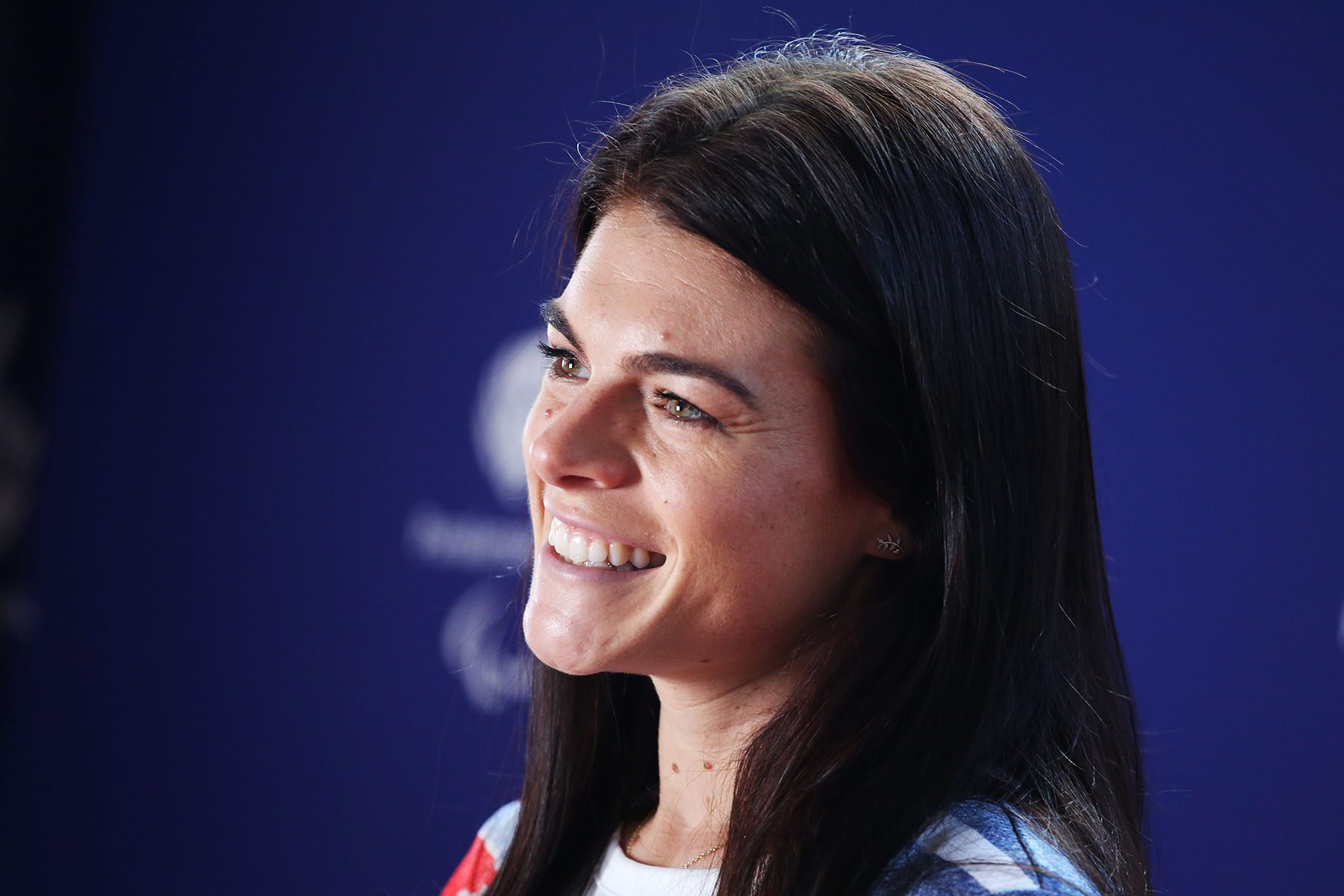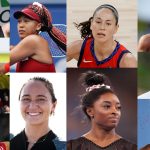*Correction appended.
Following a years-long trend in elite parasports, a record number of women competed in the 2022 Paralympics, which ended on Sunday. This year was also one of many firsts for how the Paralympics were covered. In the United States, the entire games were shown for the first time. And in the United Kingdom, a groundbreaking team of all-disabled sportscasters covered the Paralympics.
Ahead of the Paralympics, The 19th spoke with Lauren Steadman, one of the two women on Britain’s Channel 4 sportscaster team. Steadman was born with a congenital limb difference — she was born missing much of her right arm. Steadman, a veteran Paralympian, was only 15 years old when she brought home her first silver medal for swimming at the 2015 Paralympic Games in Rio de Janeiro. Most recently, Steadman won a gold medal in the triathlon during the 2020 Summer Paralympics. Steadman is primarily an athlete, but has also dabbled in reality television — she appeared on “Strictly Come Dancing,” the United Kingdom’s equivalent of “Dancing with the Stars,” in 2018.
The 19th spoke with Steadman about the Paralympics, sportscasting and representation in both of those worlds.
This interview has been edited for length and clarity.
Luterman: You’re part of the first all disabled presenting team for Channel Four in the U.K. But this isn’t your first time presenting.
Steadman: In the Summer Games, I was there as an athlete voice to give my perspective and interview some of the other guys post race. But that’s it so far. I finished my race on the Sunday, and on the Monday I was straight into TV [sportscasting]. The first few days were a bit of a blur, because I was trying to get out of that really regimented athlete mindset and be in the media where you’re bubbly, you’re happy, you’re asking the right questions. It took a while, but I did get into the rhythm.
Sara Luterman: How has coverage of the Paralympics on U.K. television changed from when you first started watching to now?
Lauren Steadman: It’s changed dramatically. When I went to Beijing … there was nothing on TV at all. I don’t think people even really knew or cared about it in the U.K. Then came London. Because it was a home game, people got especially excited about the Olympics. Everyone was pretty down in the dumps after the Olympics finished. They were like, “Oh, it’s gone — but hang on a minute, we’ve got the Paralympics!” All our venues were full. They were maxed out with people who weren’t able to go see the Olympics, so they went to see the Paralympics.
I think that Channel 4 did a fantastic job in explaining disability as well. They gave more of a comprehensive understanding. On our TVs, on the sides of buses, on the sides of airplanes, buildings, Paralympians suddenly started to appear. It got the conversation started.
When was the first time you saw someone that looked like you in the media? Do you remember?
No, actually. I think the first time that I ever really noticed somebody else with one arm was when I went to my first swimming competition. I didn’t really know about Paralympics until I attended a local swimming club. I was probably 9 years of age then. Not that I lived a sheltered life. I’m from a small village. My parents, why would they know the world of disability?
I went to this local disability swimming competition. And it was this whole swimming pool full of disabled people. It actually was a bit daunting as someone with a disability to look around and be like, “Oh, wow, there’s like a whole other world here.”
It did make me feel more accepted. In my teens, I was kinder to myself, not trying to hide my arm. I was proud of the fact that I’m an international swimmer. I’ve been to the Paralympic Games, I need to own who I am, because I’m not going to grow an arm overnight.
Sportscasting in the U.S. and the U.K. is very heavily male. Do you feel like that’s something that you’ve had to bump up against?
Doors are opening for women. They can actually go into this. In the U.K. in particular, we’ve seen Clare Balding do a fantastic job, we’ve seen Alex Scott move into the world of football and people absolutely adore her. A friend of mine, Amy Fellows, just covered the Winter Olympics. I just think again, it’s just a shift in dynamics.
Your job is being an athlete, which is not the case for most American Paralympians.
[American Paralympic athlete Grace Norman] has decided to go part time again as a nurse just because it takes off that pressure. I do work on commercials, which enables me to really relax because I’ve got some great brand partners. I’m not entirely sure I could live off of what the UK Sport gives now, but just because I’m 29. I’m not 18 anymore. I have more expenses, and my Netflix is a must-have every month.
I think the world is changing. And [Norman has] signed some great sponsors this year, which I think as well American para athletes haven’t always had access to — it’s been about the Olympians. I do feel that you guys do cover your veterans really well, though, when they’ve moved into the world of sport.
Let’s talk about inspiration porn. Can you tell me what that phrase means to you?
Are disabled people inspiring? Yes. I just think sometimes we get a bit caught up on the fact that we think people are calling us inspiring because we have a disability and not because of what we’ve achieved. If I had two hands and I was the same caliber of athlete that I am now — damn, I’m inspiring!
Personally, I don’t take offense. I’m like, “thank you,” because I’ve worked hard. I hope that there are young girls around the world who have gone, “Wow, I want to be like Lauren.” I have inspired them. I have encouraged them.
I do understand that it’s used too frequently now with Paralympians. I think that that’s just due to a lack of vocab and people not knowing what words to say. You could say that that person is uplifting, that person is challenging her own standards, challenging the world to be better, do better to be fierce. I think if we use different words [than “inspiring”] it makes people look at Paralympians differently.
The way that the Paralympics are talked about has changed as people get a better idea of what the Paralympics is and what competing in it means. Are there ads or other depictions you think have been particularly excellent?
So I’ve worked with some awesome brands. Citibank has been a standing supporter of me for the last cycle — their campaign is ‘It’s OK to Stare.” I’ve been stared at my whole life. Kids go, “Mom, she’s got one arm!” You can see the parents going “don’t say anything.” I used to hate it as a kid. And then I got to the point where I felt so sorry for the parent. So I’d go up to the kid and say, “Can you guess how I lost it, then?” And then they’re like, “Oh, this is a game? How does she lose her arm?”
[Like if] I broke a world record – stare at me because I deserve to be stared at.
Do you have any thoughts about sort of like the role of the Paralympics in disability politics?
I think you’re always going to have it and you’re going to not be able to please everyone. Also, people learn by experiencing.
I think it might have been the best TV moment of last year. There was a deaf dancer on our version of “Dancing With the Stars.” She dances every week without music. But to the public, when they’re watching on TV, they hear the music when they see her dance. But then one week, they paused the music halfway through for about a minute. She just carried on dancing. I think that was the moment she probably won the show. Because people realized all of those weeks she’d been dancing with zero music at all. People probably thought that was nearly impossible, but she proved it wasn’t. So, to me, the best thing that can happen is people to see for themselves what it’s like to live in a different way.
Do you think that there needs to be more progress in terms of how people understand the Paralympics in relation to the Olympics?
People just assume that if you have a disability, you’re automatically getting to the Paralympics. And actually, it used to be the case, because there weren’t that many people doing it. But it’s not like that now. What it took to get a gold medal all those years back, versus what it takes now is 100 percent different. The dedication, the time, the effort to get a Paralympic gold now is not the same as what it used to be all those years ago, when you could just rock up because you’re probably the only one from about half the world that was going to do the race.
When I go training and I’m riding up the mountain [on my bicycle], let’s just say there’s a pack of men in front of me. I do love to ride and overtake them. You get to the top and they’re thinking: “Oh my goodness, that girl just beat me.” And then when they pull into the cafe and they see me take off my prosthesis – They’re like, “Oh, my goodness. She’s got one arm and she just beat me.” It shows you the caliber of athlete that goes to the Paralympics. Because actually, they didn’t realize that until then.
When I swim in the pool all these people will say, “You’re inspiring.” But then they see me swim. This morning, a guy was like “Wow, that was fast.”And I was like, “Yeah, I know.”
Correction: An earlier version of this article misstated that Steadman was missing much of her left arm. She is missing much of her right arm.







